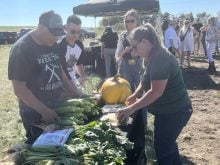By increasing fines, governments at the federal and provincial levels are sending a clear message: abuse of animals will not be tolerated.
Earlier this month the federal government doubled the fines for transporters who mistreat or improperly ship animals.
Fines of up to $10,000 can apply, and fines up to $15,000 are possible if an offender commits a second serious violation within five years of the last one.
In Saskatchewan, legislation was introduced Nov. 8 to increase fines and jail terms for offenders under the Animal Protection Act.
Read Also

Canada’s plant hardiness zones receive update
The latest update to Canada’s plant hardiness zones and plant hardiness maps was released this summer.
The maximum fine could rise to $25,000, up from $5,000, if the legislation is passed, and jail terms could rise to two years instead of six months.
In Manitoba, new regulations will require auction markets to refuse delivery of unfit animals and report the refusal to the provincial chief veterinarian.
In addition, scientists at universities across the country continue to study humane transport and proper animal handling, with the goal of minimizing stress and discomfort to food animals.
Livestock producer groups applauded increases in fines and research into animal welfare.
They know animal mistreatment benefits no one – not producers, not the industry, not the animals, not the consumers. It offers no advantage, no up side and has no defence.
As National Farm Animal Care council manager Jackie Wepruk told theProducertwo weeks ago, “there needs to be a means for the majority who do things right to distinguish themselves from that small minority that unfortunately can bring everyone else down.”
Saskatchewan SPCA executive director Frances Wach, in support of Saskatchewan fine increases, noted that producers and the public are on the same page when it comes to responses to animal abuse.
“It signals that abuse and neglect [are] unacceptable and also reflects the public’s concern for the health and wellbeing of animals,” she said.
Harsher penalties for animal abuse are important and laudable, in the fact that they send a stern message.
They may deter those without a major stake in the industry, such as inexperienced transport truck drivers or casual feedlot workers.
And they send an important message to the public that animal welfare is being monitored and is important to maintain within the business of animal agriculture.
But in cases of major livestock abuse on farms, such as the hundreds of dead cattle found near Outlook, Sask., two years ago, or the hundreds of dead and starving pigs found near Notre Dame de Lourdes, Man., earlier this year, fines would have had minimal effect.
Serious cases of neglect such as these are perpetrated by livestock owners facing major economic hardship, emotional distress, depression or mental illness. No healthy operator or operation would otherwise impose that kind of cruelty.
Tim Wiens, chair of the Farm Animal Council of Saskatchewan, knows this as well as any producer, but he thinks harsher fines might nevertheless send a message to producers on the verge of trouble.
“In the past, maybe a producer thought he could work his way out of it and just keep going and hopefully he could scrape by,” said Wiens.
“But now, with the increased penalties in place, it will probably give him a little bit more pause for thought and then before he gets too far into the soup, he can ask for help a little bit sooner.”
It is a good point.
Producers in dire trouble must be encouraged to seek help. More animal protection officers and greater awareness of avenues for assistance could aid in that effort.
The main point, however, is that harsher penalties are needed and their imposition is overdue. Animal abuse cannot be tolerated in the agriculture industry.
Bruce Dyck, Terry Fries, Barb Glen and D’Arce McMillan collaborate in the writing of Western Producer editorials.














